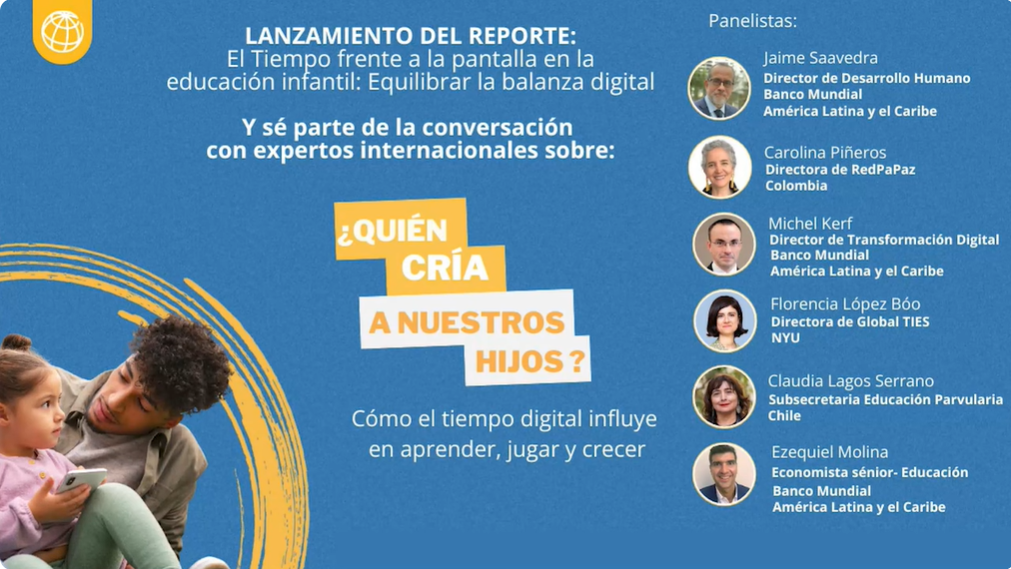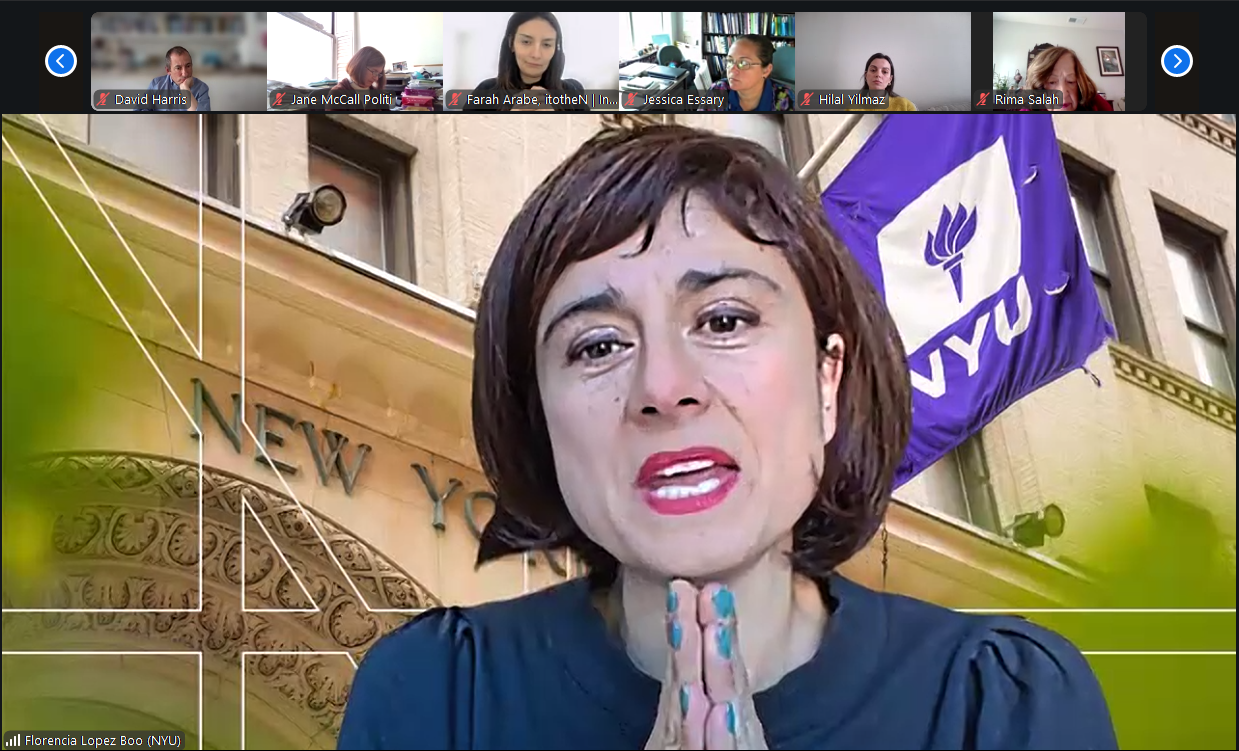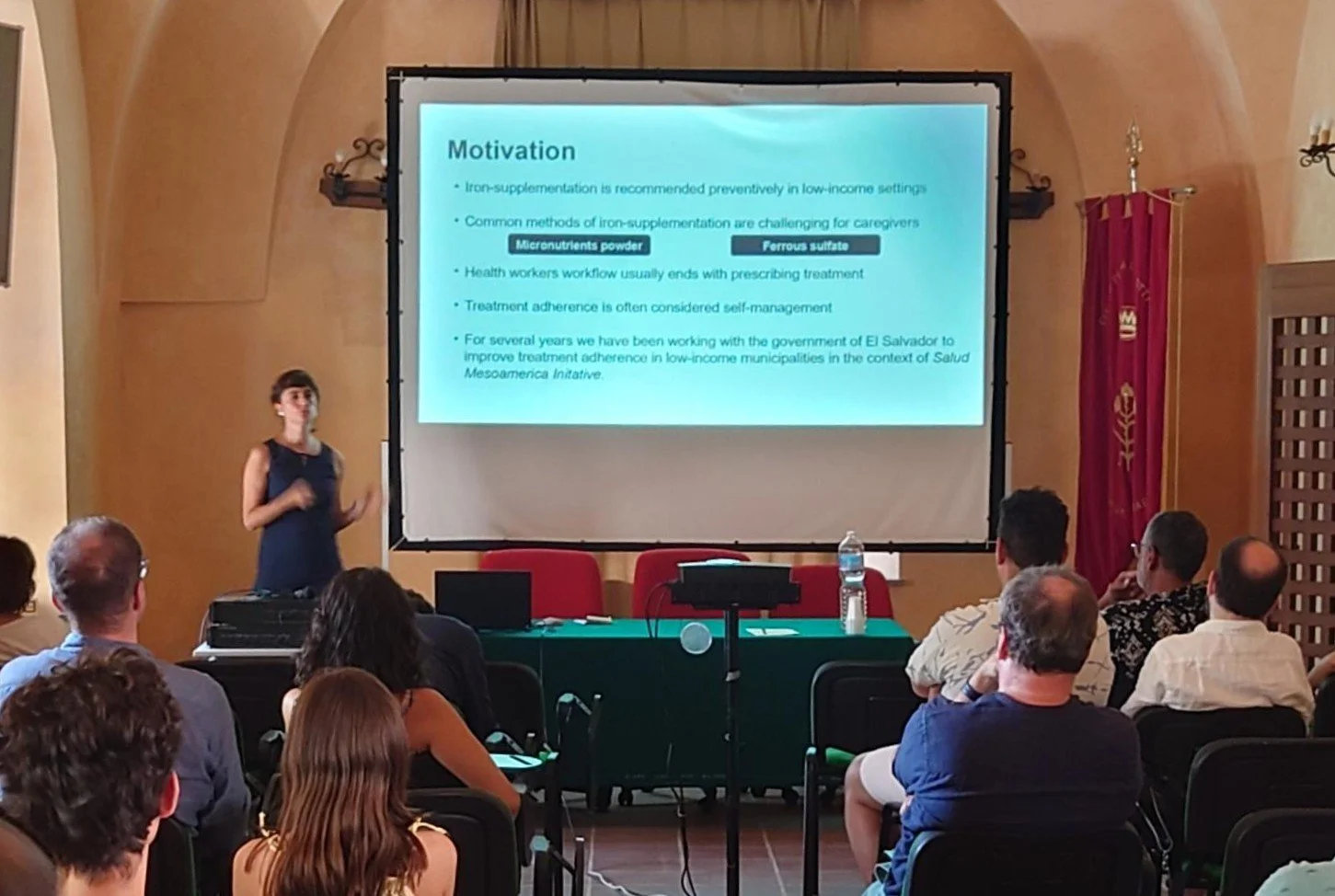Resources
Webinar en Español: “Quién cría a nuestros hijos, cómo el tiempo digital influye en aprender, jugar y crecer”
On January 9, 2026, our Director, Florencia Lopez Boo, joined a World Bank panel discussion “Quién cría a nuestros hijos, cómo el tiempo digital influye en aprender, jugar y crecer” as part of their broader initiative on early childhood education and digital environments, aiming to ground public debate and policy decisions in research rather than fear, hype, or one-size-fits-all prescriptions. Florencia Lopez Boo contributed an evidence-based perspective on young children’s learning and development in increasingly digital contexts.
The event convened researchers and policy leaders to examine how digital exposure is reshaping early childhood at home, in education systems, and across broader care environments in Latin America and the Caribbean.
The recording of the webinar “Quién cría a nuestros hijos, cómo el tiempo digital influye en aprender, jugar y crecer,” organized by The World Bank, is now available online.
Florencia Lopez Boo presented at an official side event of the 64th Session of the UN Commission for Social Development
On February 5, 2026 Florencia Lopez Boo, Director of Global TIES for Children, spoke on a virtual panel convened as an official side event of the 64th Session of the UN Commission for Social Development.
The discussion focused on how integrated social protection and early childhood care and education can better safeguard children’s rights and support more just and resilient societies, particularly in contexts of crisis and displacement. Florencia shared experiences from a collaboration between Global TIES for Children, GHESKIO, and IDB to pilot an adaptation of a remote early learning program for children in Haiti, whose school is often disrupted because of political violence and unrest.
Florencia Lopez Boo presented at an event on Neuroscience and Education for the Future: Challenges and Opportunities in the Latin-America Region
On December 9, 2025 our Director, Florencia Lopez Boo, joined “Neurociencia y Educación para el Futuro: Desafíos y oportunidades en la región,” (“Neuroscience and Education for the Future: Challenges and Opportunities in the Latin-America Region”) an event organized by the School of Education at Universidad de 'San Andrés'. Florencia presented about how neuroscience can inform public policies in education and - along with Sebastian J. Lipina, Diego Golembek, and Ezequiel Gomez Caride - contributed to a broader discussion on the challenges and opportunities for the neuroscience of education. The event brought together teachers, school directors, scholars and practitioners examining how neuroscience can inform education systems across Latin America. In her remarks, she noted that while nudges opened the door for behavioral science in policymaking, a neuroscientific approach represents a deeper shift in how policy can improve people’s lives. We are grateful to UDESA for convening this timely conversation and for inviting Global TIES for Children to engage with colleagues across the region on the future of education.
Florencia Lopez Boo presented at the Inaugural Nutrition & Early Years Advisory Group (NEYAG)
Congratulations to all those involved in launching the Nutrition & Early Years Advisory Group (NEYAG), which was inaugurated on December 4, 2025 at a meeting titled: “Shaping the Future of Africa: Nutrition and Early Childhood Development as Game Changers.”
Hosted in Dakar by the World Bank and partners, the meeting brought together leaders across sectors to advance strategies that strengthen human capital through improved nutrition and early childhood development.
At the event today, our Director, Florencia Lopez Boo, shared insights from Global TIES for Children’s research portfolio on how to integrate health, nutrition, and child development policies, highlighting evidence on what policy environment is needed to enable such integration and what governance structures and regulations can inform impactful, scalable policies across the continent.
Florencia Lopez Boo presented at the IDB Regional Policy Dialogue: Transforming Early Childhood Development in Latin America & Caribbean
Florencia Lopez Boo presented at the 2025 Inter-American Development Bank Regional Policy Dialogue: "Childhood, Innovation, Impact: Transforming Early Childhood Development in Latin America and the Caribbean (LAC)" in Mexico City.
More than 100 participants, including authorities from 17 LAC countries, donors, civil society, and academics.
Wonderful speakers and panelists such as Susan Walker, Mariano Bosch Mossi, Marta Rubio-Codina, Carolina Freire, Romina Tome, Alexandre Bagolle, Claudia Vazquez, Jorge Gaete, Filipa de Castro, Eunice Deras, Andrés Moya, among many others.
Tremendous master lecture by James Cairns.
And a first-class closure of the "Child Development Innovation Fund."
Not only was it motivating to discuss the challenges of Latin America in the coming years, it was also nice to catch up with the Haiti and Argentina teams whom we are working on border agendas, and to see so many dear friends and colleagues. Congratulations to the Pablo Ibarraran team and the Inter-American Development Bank for this unique space for reflection.
Global TIES, The Agency Fund & NYU Office of the Provost co-hosted The Agency Summit
The Global TIES team was proud to co-host on NYU’s campus, The Agency Summit with The Agency Fund and NYU Office of the Provost. Organized alongside #UNGA week here in New York City, The Agency Summit on Friday, September 26th, was designed to “foster collaboration between researchers, practitioners, and funders to explore how personal and collective agency can be harnessed to promote sustainable development outcome.”
The full-day agenda was opened by heavy-hitters Hazel Markus, Karla Hoff, and Joseph E. Stiglitz, and included many engaging conversations.
In a day full of standout moments, we want to highlight the “Practice” panel with Tarun Cherukuri, Amanda Beatty, Carolina Trivelli Avila, and Hirokazu Yoshikawa (moderated by our very own Florencia Lopez Boo): a grounded conversation on turning evidence into decisions that communities can actually use.
We loved Kate Schwartz’s reflections on implementation, measuring what matters, building feedback loops, and staying close to context.
Florencia Lopez Boo, Maria de la Paz Ferro, Pedro Carneiro, published a paper on the short-term effects of new gov’t home-visit program integrated into health-care services in Brazil
Delivering early-childhood programs at scale is a major policy challenge. One way to do so is by using existing public infrastructure. This paper experimentally assesses the short-term effects of a new government home-visiting program integrated into health-care services. The program changed the allocation of time for community health workers by asking them to carry out tasks related to early-childhood development. We find that access to the program has a positive but modest effect on home environment quality and no effect on child development or on children’s health status. Our results point to the importance of workload, supervision, and buy-in from delivery actors to enhance fidelity of interventions.
Florencia Lopez Boo, Orazio Attanasio, Diana Perez-Lopez, Sarah Anne Reynolds, published an article discussing inequality in early childhood development in Latin America
Gaps in child development by socio-economic status (SES) start early in life, are large and can increase inequalities later in life. We use recent national-level, cross-sectional and longitudinal data to examine inequalities in child development (namely, language, cognition and socio-emotional skills) of children 0–5 in five Latin American countries (Chile, Colombia, Mexico, Peru and Uruguay). In the cross-section analysis, we find statistically significant gaps with inequality patterns that widely differ across countries. For instance, gaps in language and cognition for Uruguay and Chile are much smaller than those for Colombia and Peru. When turning to the longitudinal data, average SES gaps are similar to those of the cross-section in language but differ substantially in cognition, mainly in Uruguay where they emerge as more unequal when cohort effects do not operate. Importantly, we also find that the ECD gaps found at early ages (0–5) still manifest 6–12 years later in almost all locations and realms in which we have measures of early child development, but they do not increase with age. Results are robust to using different measures of inequality (income and maternal education). Gaps are smaller but generally remain when adjusting for possible explanatory factors (e.g. family structure, parental education, geographic fixed effects). To reduce ECD inequality and promote equality in later life outcomes, policymakers should look to implementing evidence-based interventions at scale to improve developmental outcomes of the most disadvantaged children in society.
Watch Florencia Lopez Boo’s 2025 Thrive Conference Keynote
Florencia Lopez Boo had the honor of delivering a keynote on “Investing Better in Child Development Policies, ”sharing reflections on how we can improve the design and delivery of impactful programs at scale.
Florencia Lopez Boo participated in the 2025 Petralia Applied Microeconomics Workshop
TIES Director Florencia Lopez Boo recently participated in the 2025 edition of the Petralia Applied Microeconomics Workshop!
Florencia Lopez Boo delivers 2025 Thrive Conference Keynote
Florencia Lopez Boo had the honor of delivering a keynote on “Investing Better in Child Development Policies,”sharing reflections on how we can improve the design and delivery of impactful programs at scale.
We were also proud to present our poster on hybrid modalities of parenting programs from Jamaica, highlighting how flexible, evidence-informed models can better support families. Special thanks to Susan Walker and Fahmida Tofail for the insightful discussions.
Effects of Integrating Early Childhood with Health Services: Experimental Evidence from the Cresça com Seu Filho Home-Visiting Program
Delivering early-childhood programs at scale is a major policy challenge. One way to do so is by using existing public infrastructure. This paper experimentally assesses the short-term effects of a new government home-visiting program integrated into health-care services in Brazil. The program changed the allocation of time for community health workers by asking them to carry out tasks related to early-childhood development. We find that access to the program has a positive but modest effect on home environment quality and no effect on child development or on children’s health status. Our results point to the importance of workload, supervision, and buy-in from delivery actors to enhance fidelity of interventions.
The cost of not investing in the next 1000 days: implications for policy and practice
Building on the evidence from the first paper in this Series highlighting the fundamental importance of healthy and nurturing environments for children's growth and development in the next 1000 days (ages 2–5 years), this paper summarises the benefits and costs of key strategies to support children's development in this age range. The next 1000 days build on the family-based and health-sector based interventions provided in the first 1000 days and require broader multisectoral programming. Interventions that have been shown to be particularly effective in this age range are the provision of early childhood care and education (ECCE), parenting interventions, and cash transfers. We show that a minimum package of 1 year of ECCE for all children would cost on average less than 0·15% of low-income and middle-income countries' current gross domestic product. The societal cost of not implementing this package at a national and global level (ie, the cost of inaction) is large, with an estimated forgone benefit of 8–19 times the cost of investing in ECCE. We discuss implications of the overall evidence presented in this Series for policy and practice, highlighting the potential of ECCE programming in the next 1000 days as an intervention itself, as well as a platform to deliver developmental screening, growth monitoring, and additional locally required interventions. Providing nurturing care during this period is crucial for maintaining and further boosting children's progress in the first 1000 days, and to allow children to reach optimal developmental trajectories from a socioecological life-course perspective.
🔗 Read more here: https://doi.org/10.1016/S0140-6736(24)01390-4
Developmental Losses in Young Children from Preprimary Program Closures during the COVID-19 Pandemic
This article is among the first to quantify the actual impact of pandemic-related closures on early child development, in this case, for a sample of young children in Chile, where school and childcare closures lasted for about a year. We use a unique data set collected face-to-face in December 2020, which includes child development indicators for general development, language development, socioemotional development, and executive function. We find adverse impacts on children in 2020 compared to children interviewed in 2017 in most development areas. In particular, 9 months after the start of the pandemic, we found a loss in language development of 0.25 SD.
🔗 Read more here: https://doi.org/10.1086/731588















